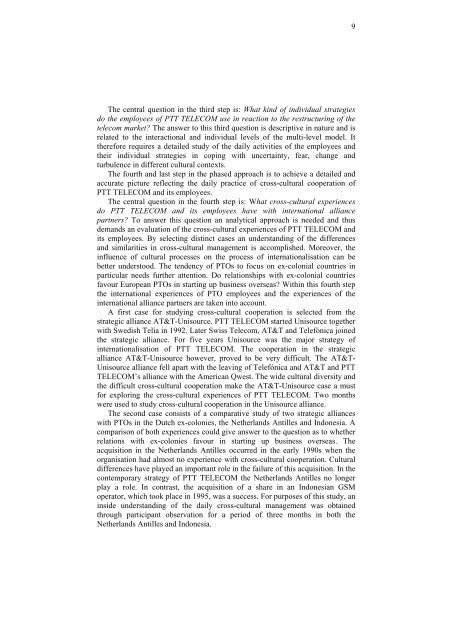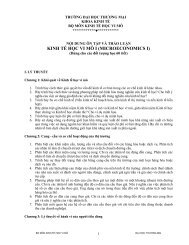The Internationalisation of PTT Telecom: A Cultural Perspective - Free
The Internationalisation of PTT Telecom: A Cultural Perspective - Free
The Internationalisation of PTT Telecom: A Cultural Perspective - Free
- No tags were found...
You also want an ePaper? Increase the reach of your titles
YUMPU automatically turns print PDFs into web optimized ePapers that Google loves.
<strong>The</strong> central question in the third step is: What kind <strong>of</strong> individual strategiesdo the employees <strong>of</strong> <strong>PTT</strong> TELECOM use in reaction to the restructuring <strong>of</strong> thetelecom market? <strong>The</strong> answer to this third question is descriptive in nature and isrelated to the interactional and individual levels <strong>of</strong> the multi-level model. Ittherefore requires a detailed study <strong>of</strong> the daily activities <strong>of</strong> the employees andtheir individual strategies in coping with uncertainty, fear, change andturbulence in different cultural contexts.<strong>The</strong> fourth and last step in the phased approach is to achieve a detailed andaccurate picture reflecting the daily practice <strong>of</strong> cross-cultural cooperation <strong>of</strong><strong>PTT</strong> TELECOM and its employees.<strong>The</strong> central question in the fourth step is: What cross-cultural experiencesdo <strong>PTT</strong> TELECOM and its employees have with international alliancepartners? To answer this question an analytical approach is needed and thusdemands an evaluation <strong>of</strong> the cross-cultural experiences <strong>of</strong> <strong>PTT</strong> TELECOM andits employees. By selecting distinct cases an understanding <strong>of</strong> the differencesand similarities in cross-cultural management is accomplished. Moreover, theinfluence <strong>of</strong> cultural processes on the process <strong>of</strong> internationalisation can bebetter understood. <strong>The</strong> tendency <strong>of</strong> PTOs to focus on ex-colonial countries inparticular needs further attention. Do relationships with ex-colonial countriesfavour European PTOs in starting up business overseas? Within this fourth stepthe international experiences <strong>of</strong> PTO employees and the experiences <strong>of</strong> theinternational alliance partners are taken into account.A first case for studying cross-cultural cooperation is selected from thestrategic alliance AT&T-Unisource. <strong>PTT</strong> TELECOM started Unisource togetherwith Swedish Telia in 1992. Later Swiss <strong>Telecom</strong>, AT&T and Telefónica joinedthe strategic alliance. For five years Unisource was the major strategy <strong>of</strong>internationalisation <strong>of</strong> <strong>PTT</strong> TELECOM. <strong>The</strong> cooperation in the strategicalliance AT&T-Unisource however, proved to be very difficult. <strong>The</strong> AT&T-Unisource alliance fell apart with the leaving <strong>of</strong> Telefónica and AT&T and <strong>PTT</strong>TELECOM’s alliance with the American Qwest. <strong>The</strong> wide cultural diversity andthe difficult cross-cultural cooperation make the AT&T-Unisource case a mustfor exploring the cross-cultural experiences <strong>of</strong> <strong>PTT</strong> TELECOM. Two monthswere used to study cross-cultural cooperation in the Unisource alliance.<strong>The</strong> second case consists <strong>of</strong> a comparative study <strong>of</strong> two strategic allianceswith PTOs in the Dutch ex-colonies, the Netherlands Antilles and Indonesia. Acomparison <strong>of</strong> both experiences could give answer to the question as to whetherrelations with ex-colonies favour in starting up business overseas. <strong>The</strong>acquisition in the Netherlands Antilles occurred in the early 1990s when theorganisation had almost no experience with cross-cultural cooperation. <strong>Cultural</strong>differences have played an important role in the failure <strong>of</strong> this acquisition. In thecontemporary strategy <strong>of</strong> <strong>PTT</strong> TELECOM the Netherlands Antilles no longerplay a role. In contrast, the acquisition <strong>of</strong> a share in an Indonesian GSMoperator, which took place in 1995, was a success. For purposes <strong>of</strong> this study, aninside understanding <strong>of</strong> the daily cross-cultural management was obtainedthrough participant observation for a period <strong>of</strong> three months in both theNetherlands Antilles and Indonesia.9




